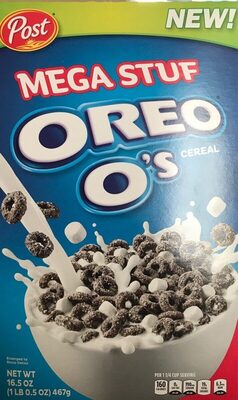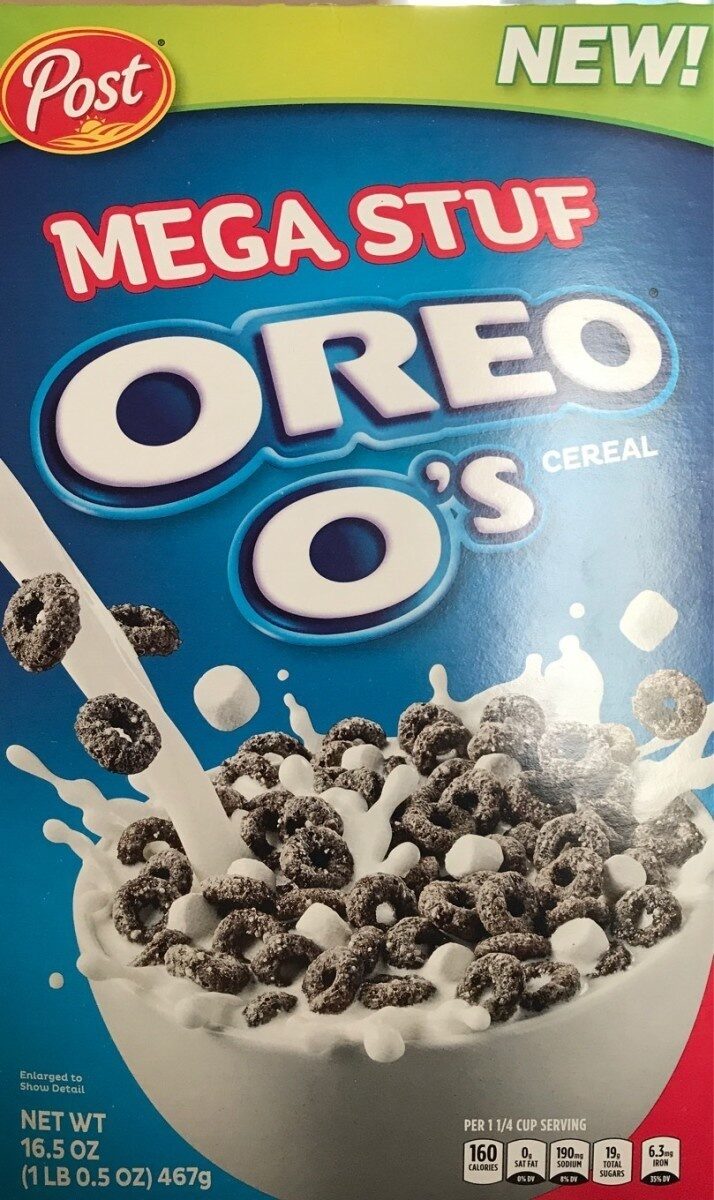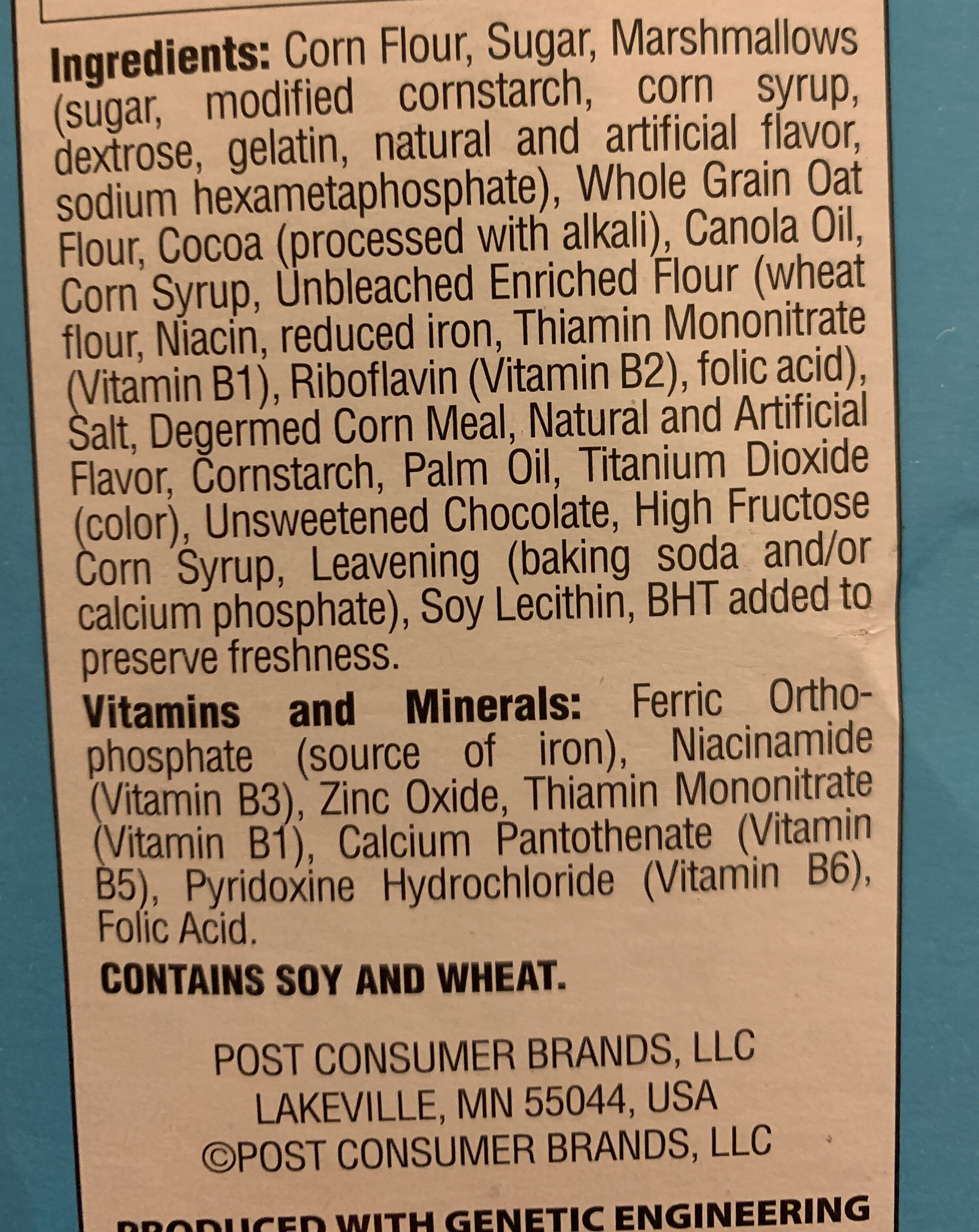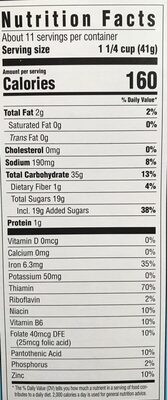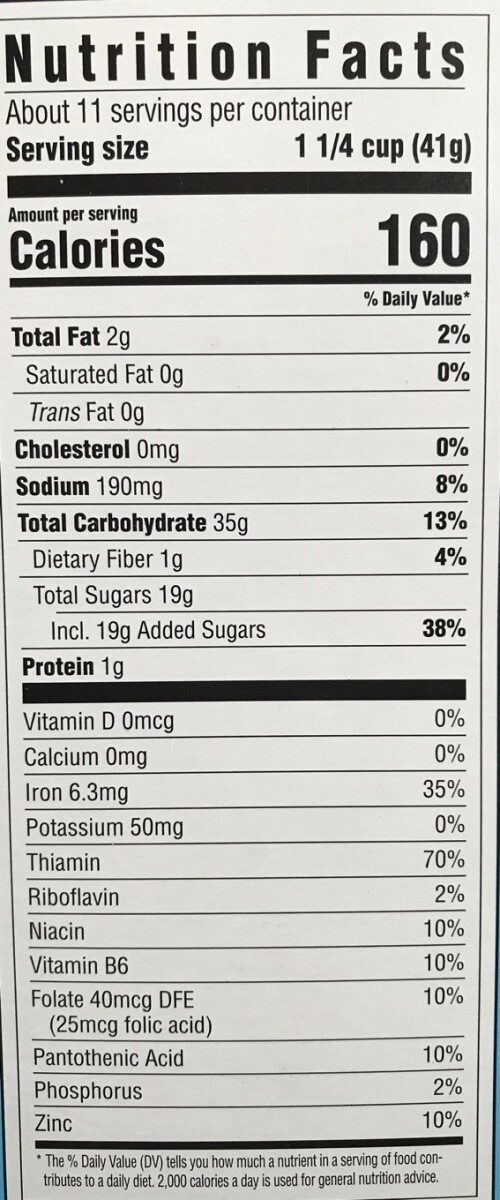Help us make food transparency the norm!
As a non-profit organization, we depend on your donations to continue informing consumers around the world about what they eat.
The food revolution starts with you!
Mega Stuff Oreo O's Cereal - 16.5 oz
Mega Stuff Oreo O's Cereal - 16.5 oz
This product page is not complete. You can help to complete it by editing it and adding more data from the photos we have, or by taking more photos using the app for Android or iPhone/iPad. Thank you!
×
Barcode: 0884912320872 (EAN / EAN-13) 884912320872 (UPC / UPC-A)
Quantity: 16.5 oz
Brands: Oreo
Brand owner: POST
Categories: Plant-based foods and beverages, Plant-based foods, Breakfasts, Cereals and potatoes, Cereals and their products, Breakfast cereals, Extruded cereals
Countries where sold: United States
Matching with your preferences
Health
Ingredients
-
49 ingredients
Corn flour, sugar, marshmallows (sugar, modified cornstarch, corn syrup, dextrose, gelatin, natural and artificial flavor, sodium hexametaphosphate), whole grain oat flour, cocoa (processed with alkali), canola oil, corn syrup, unbleached enriched flour (wheat flour, niacin, reduced iron, thiamin mononitrate (vitamin b1), riboflavin (vitamin b2), folic acid), salt, degermed corn meal, natural and artificial flavor, cornstarch, palm oil, titanium dioxide (color), unsweetened chocolate, high fructose corn syrup, leavening (baking soda and/or calcium phosphate), soy lecithin, bht (added to preserve freshness), ferric orthophosphate (source of iron), niacinamide (vitamin b3), zinc oxide, thiamin mononitrate (vitamin b1), calcium pantothenate (vitamin b5), pyridoxine hydrochloride (vitamin b6), folic acid.Allergens: Gelatin, Gluten, Soybeans
Food processing
-
Ultra processed foods
Elements that indicate the product is in the 4 - Ultra processed food and drink products group:
- Additive: E171 - Titanium dioxide
- Additive: E322 - Lecithins
- Additive: E428 - Gelatine
- Additive: E452 - Polyphosphates
- Ingredient: Colour
- Ingredient: Dextrose
- Ingredient: Flavouring
- Ingredient: Glucose
- Ingredient: High fructose corn syrup
Food products are classified into 4 groups according to their degree of processing:
- Unprocessed or minimally processed foods
- Processed culinary ingredients
- Processed foods
- Ultra processed foods
The determination of the group is based on the category of the product and on the ingredients it contains.
Additives
-
E171 - Titanium dioxide
Titanium dioxide: Titanium dioxide, also known as titaniumIV oxide or titania, is the naturally occurring oxide of titanium, chemical formula TiO2. When used as a pigment, it is called titanium white, Pigment White 6 -PW6-, or CI 77891. Generally, it is sourced from ilmenite, rutile and anatase. It has a wide range of applications, including paint, sunscreen and food coloring. When used as a food coloring, it has E number E171. World production in 2014 exceeded 9 million metric tons. It has been estimated that titanium dioxide is used in two-thirds of all pigments, and the oxide has been valued at $13.2 billion.Source: Wikipedia
-
E321 - Butylated hydroxytoluene
Butylated hydroxytoluene: Butylated hydroxytoluene -BHT-, also known as dibutylhydroxytoluene, is a lipophilic organic compound, chemically a derivative of phenol, that is useful for its antioxidant properties. European and U.S. regulations allow small amounts to be used as a food additive. In addition to this use, BHT is widely used to prevent oxidation in fluids -e.g. fuel, oil- and other materials where free radicals must be controlled.Source: Wikipedia
-
E322 - Lecithins
Lecithins are natural compounds commonly used in the food industry as emulsifiers and stabilizers.
Extracted from sources like soybeans and eggs, lecithins consist of phospholipids that enhance the mixing of oil and water, ensuring smooth textures in various products like chocolates, dressings, and baked goods.
They do not present any known health risks.
-
E322i - Lecithin
Lecithins are natural compounds commonly used in the food industry as emulsifiers and stabilizers.
Extracted from sources like soybeans and eggs, lecithins consist of phospholipids that enhance the mixing of oil and water, ensuring smooth textures in various products like chocolates, dressings, and baked goods.
They do not present any known health risks.
-
E341 - Calcium phosphates
Calcium phosphate: Calcium phosphate is a family of materials and minerals containing calcium ions -Ca2+- together with inorganic phosphate anions. Some so-called calcium phosphates contain oxide and hydroxide as well. They are white solids of nutritious value.Source: Wikipedia
-
E500 - Sodium carbonates
Sodium carbonates (E500) are compounds commonly used in food preparation as leavening agents, helping baked goods rise by releasing carbon dioxide when they interact with acids.
Often found in baking soda, they regulate the pH of food, preventing it from becoming too acidic or too alkaline. In the culinary world, sodium carbonates can also enhance the texture and structure of foods, such as noodles, by modifying the gluten network.
Generally recognized as safe, sodium carbonates are non-toxic when consumed in typical amounts found in food.
-
E500ii - Sodium hydrogen carbonate
Sodium hydrogen carbonate, also known as E500ii, is a food additive commonly used as a leavening agent.
When added to recipes, it releases carbon dioxide gas upon exposure to heat or acids, causing dough to rise and resulting in a light, fluffy texture in baked goods.
It is generally recognized as safe (GRAS) by regulatory authorities when used in appropriate quantities and poses no significant health risks when consumed in typical food applications.
Ingredients analysis
-
Palm oil
Ingredients that contain palm oil: Palm oil
-
Non-vegan
Non-vegan ingredients: E428Some ingredients could not be recognized.
We need your help!
You can help us recognize more ingredients and better analyze the list of ingredients for this product and others:
- Edit this product page to correct spelling mistakes in the ingredients list, and/or to remove ingredients in other languages and sentences that are not related to the ingredients.
- Add new entries, synonyms or translations to our multilingual lists of ingredients, ingredient processing methods, and labels.
If you would like to help, join the #ingredients channel on our Slack discussion space and/or learn about ingredients analysis on our wiki. Thank you!
-
Non-vegetarian
Non-vegetarian ingredients: E428Some ingredients could not be recognized.
We need your help!
You can help us recognize more ingredients and better analyze the list of ingredients for this product and others:
- Edit this product page to correct spelling mistakes in the ingredients list, and/or to remove ingredients in other languages and sentences that are not related to the ingredients.
- Add new entries, synonyms or translations to our multilingual lists of ingredients, ingredient processing methods, and labels.
If you would like to help, join the #ingredients channel on our Slack discussion space and/or learn about ingredients analysis on our wiki. Thank you!
-
Details of the analysis of the ingredients
We need your help!
Some ingredients could not be recognized.
We need your help!
You can help us recognize more ingredients and better analyze the list of ingredients for this product and others:
- Edit this product page to correct spelling mistakes in the ingredients list, and/or to remove ingredients in other languages and sentences that are not related to the ingredients.
- Add new entries, synonyms or translations to our multilingual lists of ingredients, ingredient processing methods, and labels.
If you would like to help, join the #ingredients channel on our Slack discussion space and/or learn about ingredients analysis on our wiki. Thank you!
en: Corn flour, sugar, marshmallows (sugar, modified cornstarch, corn syrup, dextrose, gelatin, natural and artificial flavor, sodium hexametaphosphate), whole grain oat flour, cocoa, canola oil, corn syrup, flour (wheat flour, niacin, reduced iron, thiamin mononitrate (vitamin b1), riboflavin (vitamin b2), folic acid), salt, degermed corn meal, natural and artificial flavor, cornstarch, palm oil, titanium dioxide (color), chocolate, high fructose corn syrup, leavening (baking soda, calcium phosphate), soy lecithin, bht (added to preserve freshness), ferric orthophosphate, niacinamide (vitamin b3), zinc oxide, thiamin mononitrate (vitamin b1), calcium pantothenate (vitamin b5), pyridoxine hydrochloride (vitamin b6), folic acid- Corn flour -> en:corn-flour - vegan: yes - vegetarian: yes - ciqual_food_code: 9545 - percent_min: 3.84615384615385 - percent_max: 100
- sugar -> en:sugar - vegan: yes - vegetarian: yes - ciqual_proxy_food_code: 31016 - percent_min: 0 - percent_max: 19
- marshmallows -> en:marshmallow - percent_min: 0 - percent_max: 19
- sugar -> en:sugar - vegan: yes - vegetarian: yes - ciqual_proxy_food_code: 31016 - percent_min: 0 - percent_max: 19
- modified cornstarch -> en:modified-corn-starch - vegan: yes - vegetarian: yes - ciqual_food_code: 9510 - percent_min: 0 - percent_max: 9.5
- corn syrup -> en:corn-syrup - vegan: yes - vegetarian: yes - ciqual_proxy_food_code: 31089 - percent_min: 0 - percent_max: 6.33333333333333
- dextrose -> en:dextrose - vegan: yes - vegetarian: yes - ciqual_proxy_food_code: 31016 - percent_min: 0 - percent_max: 4.75
- gelatin -> en:e428 - vegan: no - vegetarian: no - percent_min: 0 - percent_max: 3.8
- natural and artificial flavor -> en:natural-and-artificial-flavouring - vegan: maybe - vegetarian: maybe - percent_min: 0 - percent_max: 3.16666666666667
- sodium hexametaphosphate -> en:e452i - vegan: yes - vegetarian: yes - percent_min: 0 - percent_max: 2.71428571428571
- whole grain oat flour -> en:wholemeal-oat-flour - vegan: yes - vegetarian: yes - ciqual_food_code: 9310 - percent_min: 0 - percent_max: 19
- cocoa -> en:cocoa - vegan: yes - vegetarian: yes - ciqual_proxy_food_code: 18100 - percent_min: 0 - percent_max: 19
- canola oil -> en:canola-oil - vegan: yes - vegetarian: yes - from_palm_oil: no - ciqual_food_code: 17130 - percent_min: 0 - percent_max: 16.6666666666667
- corn syrup -> en:corn-syrup - vegan: yes - vegetarian: yes - ciqual_proxy_food_code: 31089 - percent_min: 0 - percent_max: 14.2857142857143
- flour -> en:flour - vegan: yes - vegetarian: yes - ciqual_proxy_food_code: 9410 - percent_min: 0 - percent_max: 12.5
- wheat flour -> en:wheat-flour - vegan: yes - vegetarian: yes - ciqual_proxy_food_code: 9410 - percent_min: 0 - percent_max: 12.5
- niacin -> en:e375 - vegan: maybe - vegetarian: maybe - percent_min: 0 - percent_max: 6.25
- reduced iron -> en:reduced-iron - percent_min: 0 - percent_max: 4.16666666666667
- thiamin mononitrate -> en:thiamin-mononitrate - percent_min: 0 - percent_max: 3.125
- vitamin b1 -> en:thiamin - percent_min: 0 - percent_max: 3.125
- riboflavin -> en:e101 - vegan: maybe - vegetarian: yes - percent_min: 0 - percent_max: 2.5
- vitamin b2 -> en:e101 - vegan: maybe - vegetarian: yes - percent_min: 0 - percent_max: 2.5
- folic acid -> en:folic-acid - percent_min: 0 - percent_max: 2.08333333333333
- salt -> en:salt - vegan: yes - vegetarian: yes - ciqual_food_code: 11058 - percent_min: 0 - percent_max: 0
- degermed corn meal -> en:degermed-corn-meal - percent_min: 0 - percent_max: 0
- natural and artificial flavor -> en:natural-and-artificial-flavouring - vegan: maybe - vegetarian: maybe - percent_min: 0 - percent_max: 0
- cornstarch -> en:corn-starch - vegan: yes - vegetarian: yes - ciqual_food_code: 9510 - percent_min: 0 - percent_max: 0
- palm oil -> en:palm-oil - vegan: yes - vegetarian: yes - from_palm_oil: yes - ciqual_food_code: 16129 - percent_min: 0 - percent_max: 0
- titanium dioxide -> en:e171 - vegan: yes - vegetarian: yes - percent_min: 0 - percent_max: 0
- color -> en:colour - percent_min: 0 - percent_max: 0
- chocolate -> en:chocolate - vegan: maybe - vegetarian: yes - percent_min: 0 - percent_max: 0
- high fructose corn syrup -> en:high-fructose-corn-syrup - vegan: yes - vegetarian: yes - ciqual_food_code: 31077 - percent_min: 0 - percent_max: 0
- leavening -> en:raising-agent - percent_min: 0 - percent_max: 0
- baking soda -> en:e500ii - vegan: yes - vegetarian: yes - percent_min: 0 - percent_max: 0
- calcium phosphate -> en:e341 - vegan: yes - vegetarian: yes - percent_min: 0 - percent_max: 0
- soy lecithin -> en:soya-lecithin - vegan: yes - vegetarian: yes - ciqual_food_code: 42200 - percent_min: 0 - percent_max: 0
- bht -> en:e321 - vegan: yes - vegetarian: yes - percent_min: 0 - percent_max: 0
- added to preserve freshness -> en:added-to-preserve-freshness - percent_min: 0 - percent_max: 0
- ferric orthophosphate -> en:ferric-orthophosphate - labels: en:iron-source - percent_min: 0 - percent_max: 0
- niacinamide -> en:e375 - vegan: maybe - vegetarian: maybe - percent_min: 0 - percent_max: 0
- vitamin b3 -> en:e375 - vegan: maybe - vegetarian: maybe - percent_min: 0 - percent_max: 0
- zinc oxide -> en:zinc-oxide - percent_min: 0 - percent_max: 0
- thiamin mononitrate -> en:thiamin-mononitrate - percent_min: 0 - percent_max: 0
- vitamin b1 -> en:thiamin - percent_min: 0 - percent_max: 0
- calcium pantothenate -> en:calcium-pantothenate - vegan: yes - vegetarian: yes - percent_min: 0 - percent_max: 0
- vitamin b5 -> en:pantothenic-acid - vegan: yes - vegetarian: yes - percent_min: 0 - percent_max: 0
- pyridoxine hydrochloride -> en:pyridoxine-hydrochloride - vegan: yes - vegetarian: yes - percent_min: 0 - percent_max: 0
- vitamin b6 -> en:vitamin-b6 - vegan: yes - vegetarian: yes - percent_min: 0 - percent_max: 0
- folic acid -> en:folic-acid - percent_min: 0 - percent_max: 0
Nutrition
-
Average nutritional quality
⚠ ️Warning: the amount of fruits, vegetables and nuts is not specified on the label, it was estimated from the list of ingredients: 5This product is not considered a beverage for the calculation of the Nutri-Score.
Positive points: 2
- Proteins: 0 / 5 (value: 1, rounded value: 1)
- Fiber: 2 / 5 (value: 2.4, rounded value: 2.4)
- Fruits, vegetables, nuts, and colza/walnut/olive oils: 0 / 5 (value: 5.03846153846154, rounded value: 5)
Negative points: 5
- Energy: 1 / 10 (value: 669, rounded value: 669)
- Sugars: 4 / 10 (value: 19, rounded value: 19)
- Saturated fat: 0 / 10 (value: 0, rounded value: 0)
- Sodium: 0 / 10 (value: 0, rounded value: 0)
The points for proteins are counted because the negative points are less than 11.
Nutritional score: (5 - 2)
Nutri-Score:
-
Nutrient levels
-
Fat in low quantity (2%)
What you need to know- A high consumption of fat, especially saturated fats, can raise cholesterol, which increases the risk of heart diseases.
Recommendation: Limit the consumption of fat and saturated fat- Choose products with lower fat and saturated fat content.
-
Saturated fat in low quantity (0%)
What you need to know- A high consumption of fat, especially saturated fats, can raise cholesterol, which increases the risk of heart diseases.
Recommendation: Limit the consumption of fat and saturated fat- Choose products with lower fat and saturated fat content.
-
Sugars in high quantity (19%)
What you need to know- A high consumption of sugar can cause weight gain and tooth decay. It also augments the risk of type 2 diabetes and cardio-vascular diseases.
Recommendation: Limit the consumption of sugar and sugary drinks- Sugary drinks (such as sodas, fruit beverages, and fruit juices and nectars) should be limited as much as possible (no more than 1 glass a day).
- Choose products with lower sugar content and reduce the consumption of products with added sugars.
-
Salt in low quantity (0%)
What you need to know- A high consumption of salt (or sodium) can cause raised blood pressure, which can increase the risk of heart disease and stroke.
- Many people who have high blood pressure do not know it, as there are often no symptoms.
- Most people consume too much salt (on average 9 to 12 grams per day), around twice the recommended maximum level of intake.
Recommendation: Limit the consumption of salt and salted food- Reduce the quantity of salt used when cooking, and don't salt again at the table.
- Limit the consumption of salty snacks and choose products with lower salt content.
-
-
Nutrition facts
Nutrition facts As sold
for 100 g / 100 mlAs sold
per serving (1 1/4 cup (41 g))Compared to: Extruded cereals Energy 669 kj
(160 kcal)274 kj
(65 kcal)-59% Fat 2 g 0.82 g -56% Saturated fat 0 g 0 g -100% Trans fat 0 g 0 g Cholesterol 0 mg 0 mg Carbohydrates 35 g 14.3 g -54% Sugars 19 g 7.79 g +2% Fiber 2.4 g 0.984 g -57% Proteins 1 g 0.41 g -88% Salt 0 g 0 g -100% Vitamin B1 (Thiamin) 3 mg 1.23 mg +194% Vitamin B2 (Riboflavin) 0.083 mg 0.034 mg -93% Vitamin B3/PP (Niacin) 4.878 mg 2 mg -61% Vitamin B6 (Pyridoxin) 0.488 mg 0.2 mg -61% Vitamin B9 (Folic acid) 61 µg 25 µg -66% Vitamin B5 (Pantothenic acid) 2.439 mg 1 mg -45% Potassium 122 mg 50 mg -39% Calcium 0 mg 0 mg -100% Phosphorus 49 mg 20.1 mg -77% Iron 15.37 mg 6.3 mg +38% Zinc 3.66 mg 1.5 mg -41% Fruits‚ vegetables‚ nuts and rapeseed‚ walnut and olive oils (estimate from ingredients list analysis) 5.038 % 5.038 %
Environment
-
Eco-Score E - Very high environmental impact
⚠ ️Select a country in order to include the full impact of transportation.The Eco-Score is an experimental score that summarizes the environmental impacts of food products.→ The Eco-Score was initially developped for France and it is being extended to other European countries. The Eco-Score formula is subject to change as it is regularly improved to make it more precise and better suited to each country.Life cycle analysis
-
Average impact of products of the same category: C (Score: 45/100)
Category: Breakfast cereals, mix of puffed or extruded cereals, fortified with vitamins and chemical elements
Category: Breakfast cereals, mix of puffed or extruded cereals, fortified with vitamins and chemical elements
- PEF environmental score: 0.63 (the lower the score, the lower the impact)
- including impact on climate change: 3.50 kg CO2 eq/kg of product
Stage Impact Agriculture
78.9 %Processing
12.6 %Packaging
3.8 %Transportation
3.9 %Distribution
0.8 %Consumption
0.0 %
Bonuses and maluses
-
Missing origins of ingredients information
Malus: -5
⚠ ️ The origins of the ingredients of this product are not indicated.
If they are indicated on the packaging, you can modify the product sheet and add them.
If you are the manufacturer of this product, you can send us the information with our free platform for producers.
-
Ingredients that threatens species
Malus: -10
Contains palm oil
Tropical forests in Asia, Africa and Latin America are destroyed to create and expand oil palm tree plantations. The deforestation contributes to climate change, and it endangers species such as the orangutan, the pigmy elephant and the Sumatran rhino.
-
Missing packaging information for this product
Malus: -15
⚠ ️ The information about the packaging of this product is not filled in.⚠ ️ For a more precise calculation of the Eco-Score, you can modify the product page and add them.
If you are the manufacturer of this product, you can send us the information with our free platform for producers.
Eco-Score for this product
-
Impact for this product: E (Score: 15/100)
Product: Mega Stuff Oreo O's Cereal - 16.5 oz
Life cycle analysis score: 45
Sum of bonuses and maluses: -30
Final score: 15/100
-
Carbon footprint
-
Equal to driving 1.8 km in a petrol car
350 g CO² per 100g of product
The carbon emission figure comes from ADEME's Agribalyse database, for the category: Breakfast cereals, mix of puffed or extruded cereals, fortified with vitamins and chemical elements (Source: ADEME Agribalyse Database)
Stage Impact Agriculture
68.8 %Processing
15.3 %Packaging
8.0 %Transportation
7.3 %Distribution
0.6 %Consumption
0.0 %
Packaging
-
Missing packaging information for this product
⚠ ️ The information about the packaging of this product is not filled in.Take a photo of the recycling information Take a photo of the recycling information
Transportation
-
Origins of ingredients
Missing origins of ingredients information
⚠ ️ The origins of the ingredients of this product are not indicated.
If they are indicated on the packaging, you can modify the product sheet and add them.
If you are the manufacturer of this product, you can send us the information with our free platform for producers.Add the origins of ingredients for this product Add the origins of ingredients for this product
Threatened species
-
Contains palm oil
Drives deforestation and threatens species such as the orangutan
Tropical forests in Asia, Africa and Latin America are destroyed to create and expand oil palm tree plantations. The deforestation contributes to climate change, and it endangers species such as the orangutan, the pigmy elephant and the Sumatran rhino.
Report a problem
-
Incomplete or incorrect information?
Category, labels, ingredients, allergens, nutritional information, photos etc.
If the information does not match the information on the packaging, please complete or correct it. Open Food Facts is a collaborative database, and every contribution is useful for all.
Data sources
Product added on by kiliweb
Last edit of product page on by moon-rabbit.
Product page also edited by goobersmash, openfoodfacts-contributors, org-database-usda, quentinbrd, roboto-app, tmbe7, yuka.UzVvZ0U0aFFwZHNQZ3NFQ29RN3c1OVFsNXFQNGZEMlFCc1k2SUE9PQ, yuka.sY2b0xO6T85zoF3NwEKvlkFZC-fdogDhCkLRpXDalvinDpPnRshxwZT4Nas.
